Punishment under Article 175 of the Criminal Code of the Russian Federation for buying stolen goods
If the acquisition of stolen goods was unintentional, then the buyer will not be punished with imprisonment. But he may suffer financially, and a visit from law enforcement officers will bring moral suffering. After all, there is a trial ahead, and before that there are investigative actions.
Note!
This can be avoided provided that before the items reached law enforcement officers, they passed from one owner to another many times.
If people, in search of an opportunity to save money, look for what they need at a flea market, they go to stores with used goods, without knowing anything about where the things come from. It is difficult to convict them of purchasing stolen goods in this situation, but it is important to remember that things may be confiscated or you will have to pay a fine.
Features of buying and selling stolen goods
The acquisition and sale of property that is stolen is possible by a person who has no idea about the real origin of the thing. In this case, there is no criminal liability, but it will be necessary to prove that the person is truly unaware that the item is stolen.
During the investigation of a criminal case, a person can call and ask questions of interest to the investigator. The person will also have to be present at the trial and provide the same information that was recorded in the records by the law enforcement official. It is worth noting that the number of cases in the category related to the resale of property is small. In this case, it is quite difficult to identify the person who sold the stolen goods.
It is difficult to prove the fact that a person is aware that his purchase is an item that was stolen from someone, especially when the purchase takes place in a pawnshop, market or stores selling used goods. In this case, the buyer may face a fine or, most often, confiscation of the item.
Legal characteristics
The subject of the crime is property obtained illegally. The situation of illegal trafficking of stolen goods is regulated by the following legislative documents:
- Article 158 of the Criminal Code of the Russian Federation defines the concept of property;
- buying stolen goods - Article 175 of the Criminal Code of the Russian Federation.
The subject of the crime is not necessarily the item that was stolen. It can be any thing obtained illegally. Ownership in the absence of ownership documents will be illegal. In criminal law, acquisition means the ability to possess and use an object.
The crime will look like this:
- the objective party will be the commission of any of the actions: the acquisition or sale of an item over which a crime is committed;
- the subjective side will be the misappropriation of stolen property, both compensated and gratuitous.
Acquisitions are divided into groups:
- promised;
- unpromised.
If the second option is implemented, then the buyer does not have the risk of becoming a participant in a crime and applying for actual imprisonment.
This crime - sale and purchase of stolen goods, Article 175 of the Criminal Code of the Russian Federation, provides for punishment. According to this article, the composition of the crime itself and its qualifying features are determined.
To determine the corpus delicti, the fact of committing one of two actions must be confirmed:
If they exist, the Criminal Code considers that an offense has been committed. The following are the characteristics:
- whether it was committed by one person;
- whether it was committed by a group of people;
- whether there was collusion among a group of persons;
- whether a car was the subject of the crime;
- whether the official position was used.
Responsibility for buying and selling stolen goods
According to Article 175 of the Criminal Code of the Russian Federation, actions can go in two directions: buying or selling illegally acquired items. Before moving on to determining punishment, it is important to qualify four elements:
- The object of the crime is someone else's property or property, illegal circulation of goods.
- When determining the objective side, it becomes clear through what relationships the property was acquired. Important for the investigation will be the place and time of acquisition of the property and the method of its sale. It can not only be sold, but also given as a gift.
- The subject can be a legally capable person over the age of sixteen. The presence of direct intent is important. Anyone who bought stolen goods should know that these are things stolen from other persons and are subject to return according to the law.
Article 175 of the Criminal Code of the Russian Federation for the purchase of stolen goods in Russia indicates that this crime, like other similar ones, may have punishments of varying severity:
- Part one provides that the buyer may face not only a fine of up to forty thousand rubles, but also up to four hundred and eighty hours of compulsory correctional and forced labor or imprisonment.
- Under part two, a person guilty of theft or buying may be punished with five years of forced labor, imprisonment, or a fine of up to eighty thousand rubles. Under the same article, he faces arrest for up to six months or three years of restriction of freedom.
- Buying stolen goods, Article 175 of the Criminal Code of the Russian Federation, part three, means forced labor for up to five years. In this case, this punishment may be supplemented by restriction of freedom for a term of up to two years or imprisonment for a term of up to seven years plus a fine of up to eighty thousand rubles.
Corpus delicti
The object is the procedure for the sale of objects and things obtained illegally.
The subject is only from the age of sixteen and must be a person who did not participate in the commission of a crime of obtaining things.
From the objective side, the crime is characterized by certain actions aimed at acquiring or selling stolen items. This will not include temporary storage.
We will talk about other types of intent in criminal law in the article here https://lexconsult.online/8603-klassifikatsiya-vidov-prestupnogo-umysla
Even if a person acquired the subject of a crime without knowing how it was obtained, he will still be confiscated, but he will not be held accountable. Money spent on an illegal purchase can be demanded from the criminal in court.
Art. 175 of the Criminal Code of the Russian Federation corpus delicti
Dear readers!
Our articles talk about typical ways to resolve legal issues, but each case is unique. If you want to find out how to solve your particular problem, call: 8 Moscow8 St. Petersburg
or if it’s more convenient for you, use the online consultant form!
All consultations with lawyers are free.
This is not the easiest article, since it is possible to prosecute a citizen under it only if, when purchasing a product, he knew about its dishonest origin, but bought it anyway.
Moreover, the knowledge itself had to come to him in the period between the theft and purchase.
It is important to understand: if the buyer knew before the theft that he would acquire stolen property, he will be charged as an accomplice.
The crime will be as follows:
- The subject of the crime: it is any things obtained in this way.
- Object: established procedure for the sale of stolen goods.
- Subject: Any person over 16 years of age who was not directly involved in the theft.
- Objective side: illegal actions, buying or selling things. This does not include transferring items for temporary storage.
- Subjective side: direct intent. A citizen must understand that he has stolen goods in his hands, but this does not stop him.
It is worth noting: if a citizen did not know that he was buying illegally purchased goods, he cannot be prosecuted under the article. However, the goods themselves may be confiscated as evidence.
Possible liability
If the same actions are committed not by one person, but by a group, or in relation to products of the oil refining industry, a car or other property on a large scale, then the minimum punishment is restriction of freedom for a term not exceeding three years, while the most serious is imprisonment for up to 5 years with payment of a fine in a specified amount or a certain amount of wages.
The above acts committed by an organized group or someone using their position in accordance with their position will entail one of the following types of punishment:
- forced labor (no more than 5 years) plus restriction of freedom for up to 2 years or without it;
- imprisonment (not more than 7 years) with an additional penalty of a fine of up to 80,000 rubles or earnings of up to six months, as well as with or without restriction of freedom for 2 years.
When qualifying criminal actions under this article, the purpose of acquiring stolen or otherwise illegally obtained property does not matter: a gift to third parties, personal use of the item, subsequent resale, etc. The article on purchasing stolen goods in Russia will be applied only in the case where the buyer knew that he was buying an item obtained in bad faith, but received in the course of carrying out the objective side of the crime.
Examples from judicial practice
There is extensive practice under Article 175 of the Criminal Code of the Russian Federation. Criminals often sell stolen or illegally stolen property without seeking to legalize it.
Examples of cases:
- Citizen E. was engaged in thefts, illegally entered the homes of citizens and took things he liked there. Usually these were electronic equipment, jewelry, and documents. He had an accomplice who sold stolen goods, the proceeds were divided in half. By chance, an investigation came to light on the accomplice, who was looking into a case related to theft. He confessed to the crime, and in the course of cooperation, revealed the name of E. Both were tried under Article 175, and E. also under an article for theft. As a result, he received 7 years in prison and a fine.
- Citizen M. stole a gold ring from her neighbor while visiting her apartment. She decided to sell it, took it to a pawnshop, and received 5,000 rubles. A neighbor discovered the loss, suspected M. and contacted the police to investigate. The investigation quickly revealed M.’s guilt and convicted her. She received a 1-year suspended sentence and payment of moral damages.
- Citizen G. ran a company that had several gas stations for cars. As a result of illegal activities, he stole a certain amount of gasoline and sold it at other prices to enrich himself. The investigation revealed his involvement in receiving money and selling funds and convicted him under Article 175. He lost his position, received a fine and was imprisoned for 5 years.
The decisions that are most often made
When selling stolen goods, Article 175 is often encountered. In 2022, over 1,300 cases were processed through it, of which 1,245 were processed under the 1st part and only 2 under the third. As a result, 1 person was acquitted, 132 were deprived of their freedom, 219 were given suspended sentences, 25 received restriction of freedom, 360 received a fine, 97 received correctional labor, and 440 received mandatory labor. Another 6 people were declared insane.
Aggravating and mitigating circumstances
The article for buying stolen goods in Russia states that circumstances can increase the term of punishment and liability: large and especially large size of the transaction, conspiracy of persons or an organized group, use of official position. A separate article of the Criminal Code applies to mitigating circumstances.
Complicity in crime
It is worth distinguishing the concept of purchasing stolen goods from complicity in the commission of a crime of criminal acquisition of property.
Complicity in a crime involves a promise to purchase a stolen item given in advance (complicity) or an order to steal a certain valuable item for a third party who is an accomplice (organizer, customer).
Not every criminal involved in the sale of stolen goods will betray his accomplice, since in this case he himself will personally suffer greater punishment, i.e. will be charged under Part 2 or Part 3 of Article 175 of the Criminal Code.
Features of the criminal act
Criminal penalties for buying stolen goods are imposed upon proof of intent in the actions of the buyer. If you unintentionally acquire such goods, you will not be punished under Article 175 of the Criminal Code of the Russian Federation, but the stolen items will be confiscated. Therefore, the buyer will lose money. Therefore, it is worth carefully studying the seller’s ownership rights to the goods.
The application of Article 175 does not occur often because:
- It is difficult to prove intent in acquiring a stolen item; the subject of the act denies guilt.
- It is difficult to prove that an item was stolen, since it changes many owners.
But in relation to criminals who deliberately sell stolen items and persons who purchase them knowing about the criminal origin of the goods, this norm of criminal law is in effect.
Object and subject of the crime
The object of the purchase of stolen goods is considered to be relations for the acquisition and circulation of things within the framework of the law. Subject – any property the circulation of which is not limited by law.
In the case of the acquisition and sale of illegal items (restricted in circulation), liability arises under special articles (for example, under Article 228 for drug trafficking).
Objective side
The crime under Article 175 of the Criminal Code of the Russian Federation for buying stolen goods is committed in the form of an action. The interpretation of the concept of “acquisition” is as broad as possible - any method of acquisition, be it purchase, receipt as a gift, transfer to pay off a debt.
The transfer (sale) can be gratuitous or compensated, which is not essential for qualifying the crime.
Qualifying features
Purchasing stolen goods under Article 175 of the Criminal Code of the Russian Federation may have the qualifying characteristics specified in parts 2 and 3 of the article.
The second part determines the punishment for the purchase by a group of persons by prior conspiracy, as well as for the purchase of oil and its products, a car and other property, the value of which exceeds 2 million 250 thousand rubles.
The third part of Article 175 punishes this offense committed by an organized group or a person using official powers.
Complicity in the sale of stolen goods
Complicity in criminal law is the intentional act of two persons in a crime by prior conspiracy.
In relation to Article 175 of the Criminal Code of the Russian Federation, this is an agreement by the buyer to buy back the goods before the theft.
In this case, even if the buyer did not physically participate in the theft, he will be held liable.
Lawyer's note: it is believed that if the buyer agreed in advance to accept the stolen goods, then, firstly, he encouraged the theft, and secondly, he knew for sure that the purchased goods were stolen.
Article 175 talks about this situation in parts 2 and 3 - a crime committed by conspiracy or by an organized group. The penalty for such an offense will be higher than for Part 1 or acquisition after the commission of the offense.
However, judicial practice in this situation is varied, and a variety of people can be brought to trial. For example, if a citizen simply gives a thief a lift with stolen things or helps bring them home, he may also be prosecuted, especially if the thief points to him as an accomplice and buyer. However, for a group crime, the robber himself will bear more serious responsibility.
Lawyers recommend knowing about liability for intentionally causing harm to health of moderate severity in accordance with Article 112 of the Criminal Code of the Russian Federation.
Is crime a form of money laundering?
There are a number of ways to give illegally acquired property a legal appearance:
- Placing money in bank accounts under the guise of savings.
- Purchasing expensive things.
- Changing the appearance of illegal property (change of car license plates, etc.).
Such actions fall under Articles 174 (for the legalization of other people's income) and 174.1 (for the legalization of one's own). However, Article 175 for purchasing stolen goods does not apply to these crimes.
Punishment for acquiring stolen property
Each part of Article 175 contains its own set of sanctions for the crime committed. The punishment for buying stolen goods without qualifying characteristics (Part 1 of Article 175) provides:
- Fine up to 40 thousand rubles.
- Mandatory work up to 480 hours.
- Correctional labor for up to 2 years.
- Imprisonment for up to 2 years.
When committing a crime in a group:
- Restriction of freedom for 3 years.
- Arrest for six months.
- Forced labor for up to 5 years.
- Imprisonment for up to 5 years with a possible additional fine of 80 thousand rubles.
The third part of Article 175 provides as punishment:
- Forced labor for up to 5 years with the possibility of additional restriction of freedom for 2 years.
- Imprisonment for up to 7 years with a fine of up to 80 thousand rubles or restriction of freedom for 2 years.
The selection and application of sanctions is at the discretion of the judge.
Punishment for the sale or acquisition of property obtained by criminal means
Criminal liability for this crime begins at the age of 16.
The sale and acquisition of property obtained by criminal means is punishable (clause 1 of Article 175 of the Criminal Code of the Russian Federation):
- imprisonment for a term of up to two years;
- correctional labor for a period of 1-2 years;
- compulsory work for a period of 180-200 hours;
- a fine of up to 140 thousand rubles (a fine in the amount of the convicted person’s income or wages for a period of up to 3 months).
The acquisition and sale of property obtained by criminal means, committed on a large scale, in relation to a car, by a group of persons by prior conspiracy or in relation to oil and its products is punishable (Clause 2 of Article 175 of the Criminal Code of the Russian Federation):
- arrest for a period of 4-6 months;
- restriction of freedom for up to 3 years;
- imprisonment for a term of up to 5 years (this punishment provides for a fine in the amount of up to 80 thousand rubles or in the amount of the convicted person’s income (wages) for a period of up to 6 months).
The condition for the sale or purchase of oil obtained by criminal means applies to the oil itself - crude or fuel, as well as any petroleum products - diesel fuel, synthetic gasoline and others.
Large amount of property - more than 250 thousand rubles (Article 169 of the Criminal Code of the Russian Federation).
If the acts of paragraphs 1-2 of Art. 175 of the Criminal Code of the Russian Federation were committed by a person using his official position or by an organized group of persons in paragraph 3 of Art. 175 of the Criminal Code of the Russian Federation provides for punishment in the form of imprisonment for a term of 3 to 7 years. Also, this paragraph provides for a fine for the guilty person. The fine can reach 80 thousand rubles or be equal to the income or wages of the convicted person for a period of up to 6 months.
Stolen phones
- What will happen to a person if he used a stolen phone?
- The phone was lost or stolen, but is insured! Can they return me a new one?
- I bought the phone and it turned out to be stolen.
- How to protect his son, he bought a phone that turned out to be stolen.
- What punishment will there be if a stolen phone costs 2,000 thousand rubles?
- Publications
1.1. Paul! A claim must be filed against a person who has committed a criminal offense, i.e. on the one who committed the theft. The pawnshop in this situation is a third party.
2.1. Christina. You can definitely get your money back. Contact the seller (the Pawnshop) with a written Claim (2 copies) demanding termination of the Sale and Purchase Agreement and a refund of funds. In case of refusal or failure to receive a response within 10 days (including postal mileage), file a Claim in court demanding termination of the Sale and Purchase Agreement and collection of funds, penalties, fines, compensation for moral damages and compensation for all collection costs.
2.2. Christina You need to prepare documents and contact the seller in a pre-trial manner. If you refuse, file a lawsuit and, if you do everything correctly, win the trial. Sincerely.
2.3. File a complaint with the seller. If the seller does not satisfy the claim voluntarily, go to court. Good luck!
3.1. To help you, we need to know the details of your situation; documents have been drawn up to confiscate your phone; other significant facts.
You can file a claim with the pawnshop. You can go to court if there are grounds.
You can write a corresponding statement to the police.
4.1. You have the right to file a claim in court for the return of funds received under the purchase and sale agreement on the basis of Article 461 of the Civil Code of the Russian Federation.
4.2. Go to court and recover money.
5.1. Nadia. Look what the story is. After all, the phone was stolen, and therefore it still belongs to its owner. It turns out you caused damage to his property. And he has the right to demand compensation for the damage caused.
Your actions directly in the commission store
— When going to thrift stores, you should not announce at the door that you are looking for things stolen from you - in this case, they can quickly “disappear” from the counter.
- If you have already discovered stolen items in a store, then simply making a fuss and demanding your property from the seller is a rather useless exercise.
- First, make sure that these are exactly your things: compare the serial numbers (if it is equipment), find out when the goods were handed over for consignment, ask the seller to “put aside” the goods so that he does not have time to sell it to another person.
— You should return to the store directly in the company of representatives of law enforcement agencies, who will ask the seller to show the agreement that was drawn up when handing over the goods for commission.
- In the presence of the police, you will need to prove that the thing found belongs to you. A statement describing the stolen property, receipts, invoices, photographs - all this is proof that you are the owner of the property. If you have already filed a police report, you simply need to notify the investigator assigned to your case about your findings. It’s okay if you haven’t submitted an application yet - it will be accepted in any case, and your personal “investigation” will make the task easier for the investigators.
— If the store refuses to return your property, the police will draw up a protocol, on the basis of which the case will be referred to trial (Articles 301-303 of the Civil Code of the Russian Federation, Articles 160, 175 of the Criminal Code of the Russian Federation).
What will happen to a person if he used a stolen phone?
7.1. Everything will depend on many factors.
8.1. There is no threat, calm down. If your mother did not secretly steal the phone, but found it or bought it second-hand, and there is confirmation of this circumstance, then there is no corpus delicti in her actions. The phone will have to be returned to the owner.
8.2. Your mother needs to testify to the investigator about the circumstances of the discovery of the phone and the reasons why she did not take it to the police and continue to hope that she will not be accused of theft.
8.3. The phone must be seized by the police as material evidence (depending on what the police are currently conducting - a check under Articles 144-145 of the Criminal Procedure Code of the Russian Federation or a criminal case has been opened under Article 158 of the Criminal Procedure Code of the Russian Federation.
The mother must be interviewed or interrogated by the police as a witness (where she found him, when and other questions). If the mother really found him, she will not face anything within the law. If you have any questions or need a more detailed answer, you can call me. 8-960-480-17-17
9.1. first you need to draw up a claim and send it to your debtor, after the claim is answered, go to court.
10.1. In addition, when the thief is caught, you can file a claim against him to recover the material damage caused to you. Such a claim is filed either at the stage of preliminary investigation to the investigator (when you will be interrogated as a witness, or in court when considering a criminal case, or after it, when the verdict comes into force, to a civil court.
10.2. You can contact the pawnshop with this Resolution. File a claim with them, the police will not give you the money. If the pawnshop does not return the money, then go to court.
10.3. This is the basis for presenting a demand to the pawnshop to terminate the contract and return the money. Have a lawyer prepare the documents. You can contact the lawyer of this site in private messages for detailed advice and preparation of written documents. The cost of the service is discussed individually.
11.1. Yes, of course, the investigator legally has your spouse’s Izmit phone number! This is documented in a seizure protocol if your spouse brings it to the investigator on his own, having previously issued a resolution to carry out the seizure. In fact, the phone is legally subject to return to the previous owners. And you have every right to contact the pawnshop with a claim for the return of the money spent on purchasing this phone from them; in case of refusal, go to court. In this case, the court will be on your side.
11.2. They can, if it is truly stolen, in which case the responsibility lies with the pawnshop and they must return the money paid to him.
First steps: general recommendations
If you discover a theft, the first thing you need to do is go to the police station where the theft occurred and write a statement.
They must accept it (according to Article 144 of the Criminal Code of the Russian Federation), or give a written refusal, with which you can contact the prosecutor’s office. In your statement, try to describe in detail the stolen items, their distinctive features, cost, defects, attach photos you have or, for example, receipts and documents for the stolen equipment.
Read also: AiF.ru correspondent, who became a victim of theft, managed to rescue his belongings from the purchase. Report by Lyudmila Alekseeva >>
After this, you can try to look for your property yourself, for example, in nearby second-hand stores, stalls selling used equipment, and even from barkers inviting you to buy equipment on the cheap.
Advice: if the equipment is stolen, and you do not have the receipt and do not remember the serial number of the product, they will try to help you in the store where you made the purchase, and you may need a box, a warranty card, and also (required) a passport or other identification personality. If you do not have any physical evidence of the purchase, you can try to restore the data using indirect evidence, such as the date of purchase, amount, technical characteristics, and other data at the discretion of the store manager.






